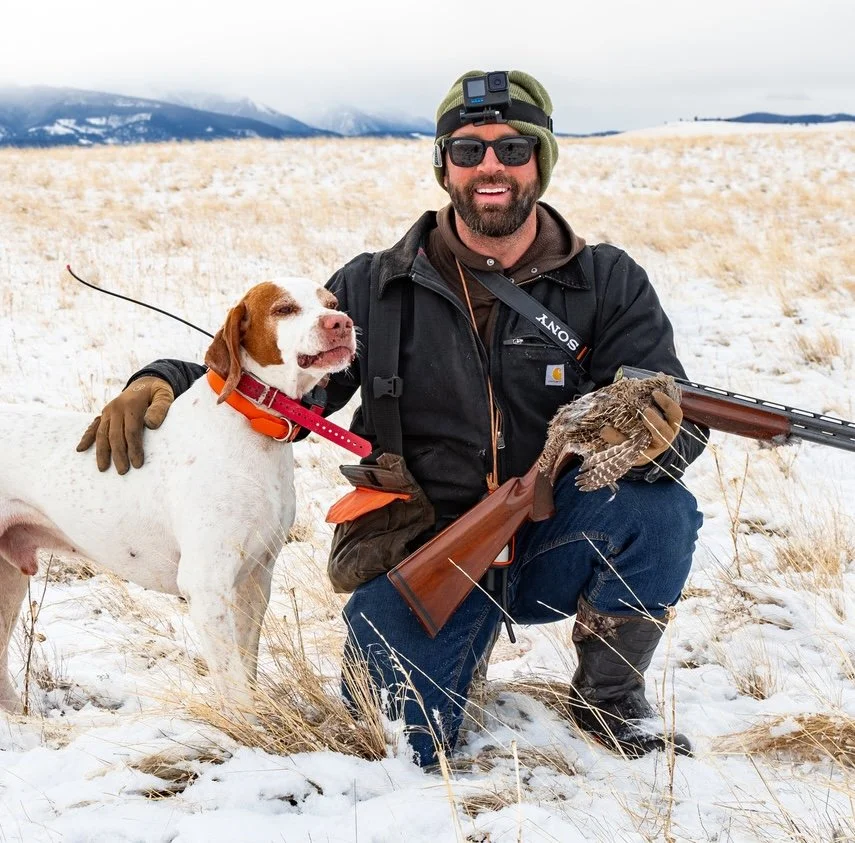Vet Spotlight: Dr. Hunter Rung
From pad injuries to snake bites, Dr. Rung sees every possible field issue faced by canine athletes
Hunter Rung, DVM: “Sporting dogs have an unmatched combination of heart, intelligence, and grit. They live to work and please their owners, and that passion makes them incredibly rewarding partners.”
Welcome to Vet Spotlight, a profile series where we highlight members in the Hunt.Vet directory.
If you’ve got a mental image of a hard working, hard hunting Montana veterinarian, chances are they’d look a lot like Dr. Hunter Rung
Heck, he’s even got the name for it.
When he’s not operating his own veterinary practice, Horse and Hound Veterinary Service, you’ll find Dr. Rung in the field with his pointers, often on horseback.
Dr. Rung was one of the very first verified Hunt.Vet veterinarians, and he’s a big advocate for the sporting dog community as a professional and a sportsman.
HV: What inspired you to become a veterinarian?
HR: I’ve always been drawn to animals and the outdoors. Growing up hunting and working with dogs, I developed a deep respect for the connection between people and their animals. Veterinary medicine allows me to combine that love of science, problem-solving, and animal care into something meaningful—helping keep those companions healthy and in the field doing what they love.
HV: How did you get into working with sporting dogs specifically?
HR: Sporting dogs have always been a big part of my life. I’ve been running and training bird dogs for over two decades, and they’ve become more than hunting partners—they’re family. When I started my practice, it was a natural fit to focus on the unique needs of these hardworking athletes. Of course I see a wide array of species and clients; but because I have a passion for hunting and the animals that aid in that pursuit like my 4 Pointers and 2 horses; I have been fortunate to draw a client list of like minded individuals.
HV: What kinds of sporting dog cases do you see most often in your practice?
HR: I see a lot of soft-tissue injuries, foot and pad problems, ear infections, and lacerations from rough terrain. I also handle performance-related cases like dehydration, heat stress, and joint issues that come from long hunting days or training seasons. I can’t leave out grass seeds, foreign bodies and rattlesnake bites though.
HV: What’s one simple thing owners can do at home to keep their dogs healthier in the field?
HR: Condition them like an athlete—gradual, consistent exercise before the season makes a huge difference. A fit dog handles heat, terrain, and long days better, and it reduces the risk of injury. Hydration and proper nutrition go hand-in-hand with that. Also be prepared for injuries; build or buy a first aid kit and make sure you know what’s in it and how to use it. Work with your vet if you need something or would like to learn how to administer medication, apply a bandage or place skin staples or anything else.
HV: Do you have a go-to product or piece of gear you recommend to your sporting dog clients?
HR: A well-stocked field first aid kit is invaluable. I typically build a kit for my clients but the kit from Paradigm Sporting Dog is an excellent choice.
HV: What’s the one sporting dog trait you admire most?
“Veterinary medicine allows me to combine that love of science, problem-solving, and animal care into something meaningful—helping keep those companions healthy and in the field doing what they love.”
HR: Their drive and athleticism. Sporting dogs have an unmatched combination of heart, intelligence, and grit. They live to work and please their owners, and that passion makes them incredibly rewarding partners.
HV: Why did you join Hunt.Vet?
HR: Because it brings together veterinarians and hunters who truly understand the sporting dog lifestyle. It’s a community that values both the science and the sport—helping us share knowledge, improve care in the field, and support the people and dogs who make the hunting tradition so special.



